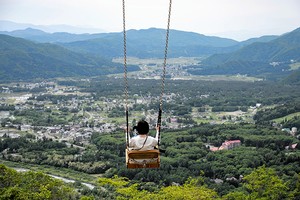Vox Populi, Vox Dei is a daily column that runs on Page 1 of The Asahi Shimbun.
June 8, 2024 at 11:53 JST
 Promotional cardboard cutouts of the actors in “Kamakuradono no 13-nin” (Asahi Shimbun file photo)
Promotional cardboard cutouts of the actors in “Kamakuradono no 13-nin” (Asahi Shimbun file photo)
“Tora ni Tsubasa” (The Tiger and Her Wings). “Bugi-ugi” (Boogie Woogie). “Kamakuradono no 13-nin” (The 13 Lords of the Shogun).
These are the titles of just three of the many “morning drama series” and “historical epic series” at Japan Broadcasting Corp. (NHK) that required Yohei Omori, 65, to work tirelessly behind the scenes.
A senior director at NHK, Omori has remained the sole “historical fact checker” in this mammoth organization for the last 25 years.
Tasked with ensuring the accuracy of historical elements presented in NHK dramas, Omori’s job is to peruse the draft script of each work and spot mistakes.
For instance, while checking the screenplay of a drama set in the Edo Period (1603-1867), Omori came across a scene where a rowhouse tenant in a blue-collar neighborhood clapped his hands in praise of a respected local elder for his classy act.
But to Omori’s professional understanding, the tenant’s reaction was a definite no-no.
Japanese people did not applaud until the Meiji Era (1868-1912).
On the other hand, it is perfectly alright for a feudal lord to complain of a “bad migraine.” Most of us think of this disorder as a relative newcomer to the modern age, but the word (“henzutsu” in Japanese) was already in an authoritative Japanese-Portuguese dictionary published in 1603.
While NHK hires experts on specific historical eras in which its dramas are set, Omori is responsible for explaining all “uncertain” phenomena that often fall through the cracks, so to speak, and remain overlooked.
And just so he won’t miss anything while on a trip, he would always travel old, historical roads and neighborhoods on foot, even if that meant making a long detour.
He has also visited so many used bookstores that he now claims he can “tell what selection of books to expect inside by just looking at the store front.”
His wealth of accumulated knowledge can be found in his published book titled “Kosho Yoshu” (literally, reminder notes for checking historical accuracy), which is now a “must-have” reference book for all drama production staff.
With his retirement from NHK now imminent, Omori has just been named as a recipient of this year’s Hoso Bunka Foundation prize.
He has always maintained that the creator of a drama is the “master” and the historical fact checker is the “servant.”
Therefore, he says, the servant must always keep a low profile. However, it is the accuracy of historical facts that serves as the foundation on which a story’s realism lies, so unless one knows the basic structure of the foundation itself, one cannot achieve anything truly unconventional.
And that is Omori’s message for all creators.
--The Asahi Shimbun, June 8
* * *
Vox Populi, Vox Dei is a popular daily column that takes up a wide range of topics, including culture, arts and social trends and developments. Written by veteran Asahi Shimbun writers, the column provides useful perspectives on and insights into contemporary Japan and its culture.




















A peek through the music industry’s curtain at the producers who harnessed social media to help their idols go global.
A series based on diplomatic documents declassified by Japan’s Foreign Ministry
Here is a collection of first-hand accounts by “hibakusha” atomic bomb survivors.
Cooking experts, chefs and others involved in the field of food introduce their special recipes intertwined with their paths in life.
A series about Japanese-Americans and their memories of World War II